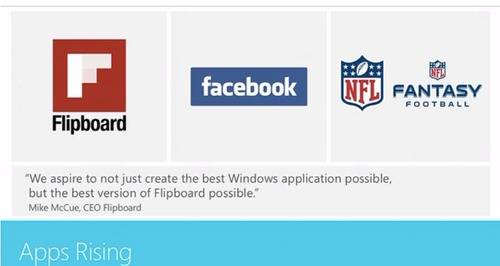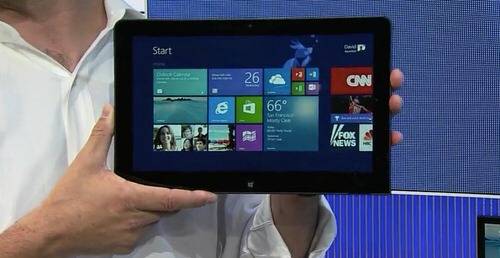
Complain or compliment all you want about the Windows 8 (and now 8.1 Preview) interface … Microsoft’s problem with Windows right now was summed up in one slide during CEO Steve Ballmer’s keynote presentation yesterday at the Microsoft Build conference.
The slide just showed icons for three new apps that would be coming to the Modern interface of Windows 8.1 soon: Facebook, Flipboard, and NFL Fantasy Football. These were the highlighted apps that Ballmer wanted to mention as part of the Windows app family, and it’s good they are ready for Windows. Finally.

The delay, especially for a Facebook app, which most operating system users would consider a must-have for their platform, is one part of the problem Microsoft is facing right now: even though Ballmer announced that the Windows Store just crossed the 100,000th app mark, there are still marquee-level apps being introduced to Windows even now.
See Also: Windows 8.1: It’s Getting Better And Stronger — Just Not Fast Enough
Which brings me to the big-picture concern: when was the last time Microsoft ever had to even think about applications for Windows? Not since Windows 286, I would imagine. Since then, app developers not only clamored to code for Windows, they were willing to put up with Microsoft’s less-than-open practices to do so.
If you didn’t write an app for Windows, you were considered a rebel at best and a nutcase at worst.
Those days seem gone now, with Microsoft still in the very unfamiliar position of having to scramble to get major app developers on board their flagship operating system’s new design. Not Windows Mobile. Not Windows Phone. Windows.

This is not just a matter of aesthetics for app developers, but a matter of committing resources. In a recent conversation with an app developer, I was told development in a Windows version of their app was delayed by the face there were so many Windows versions out there. High irony indeed, if this observation has merit, since fragmentation is what Microsoft used to lambast Linux distributions about when desktop Linux was trying to be a thing.
Now this is Microsoft, of course, and they will eventually be coming along. But their shift to a more mobile-oriented world has not been without its growing pains – pains that we still can see are in progress.
If anything, this has been a lesson in humility for Microsoft: you can’t count on market dominance to force your users and developers to comply with whatever change you want to make.

















